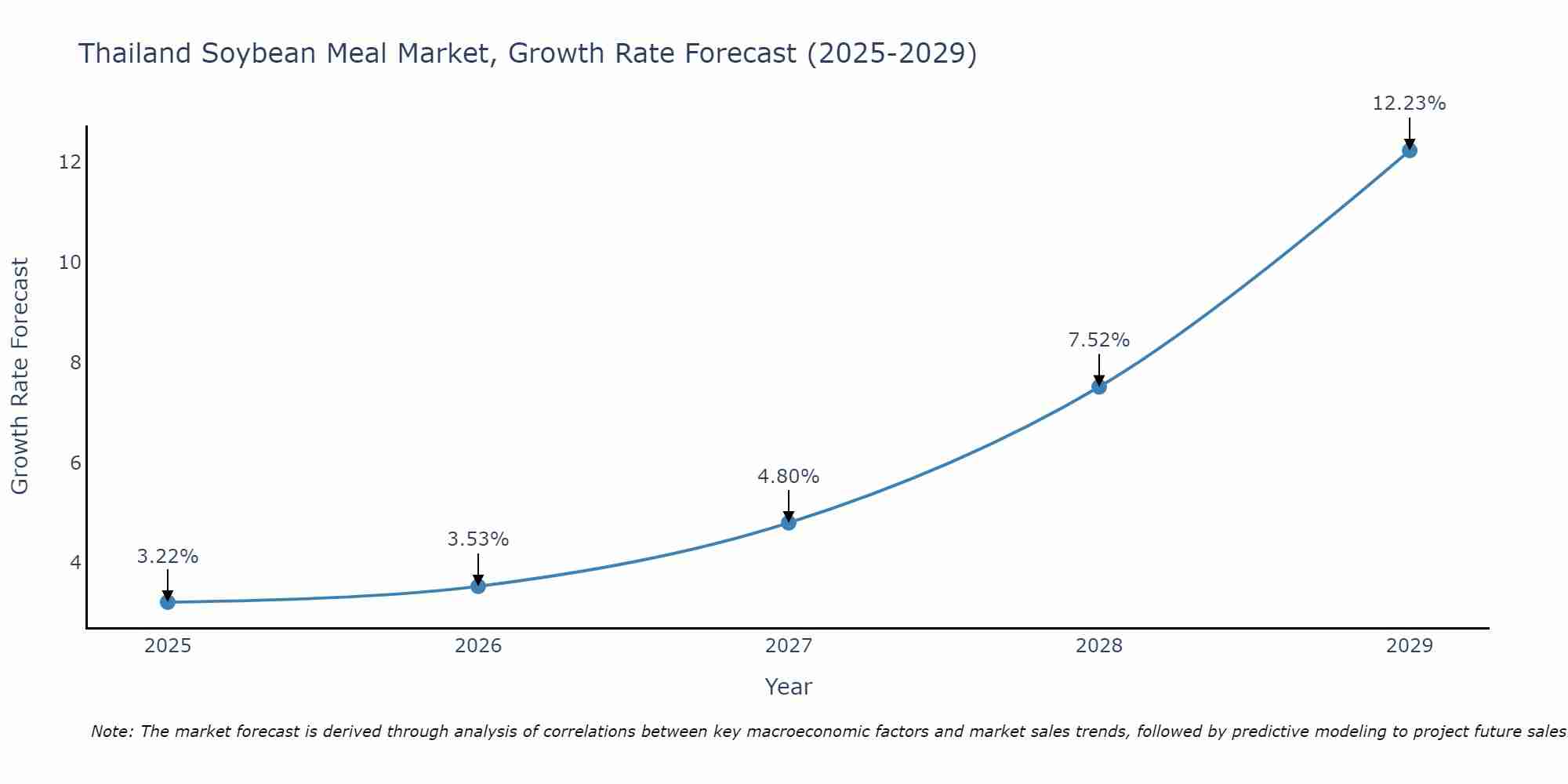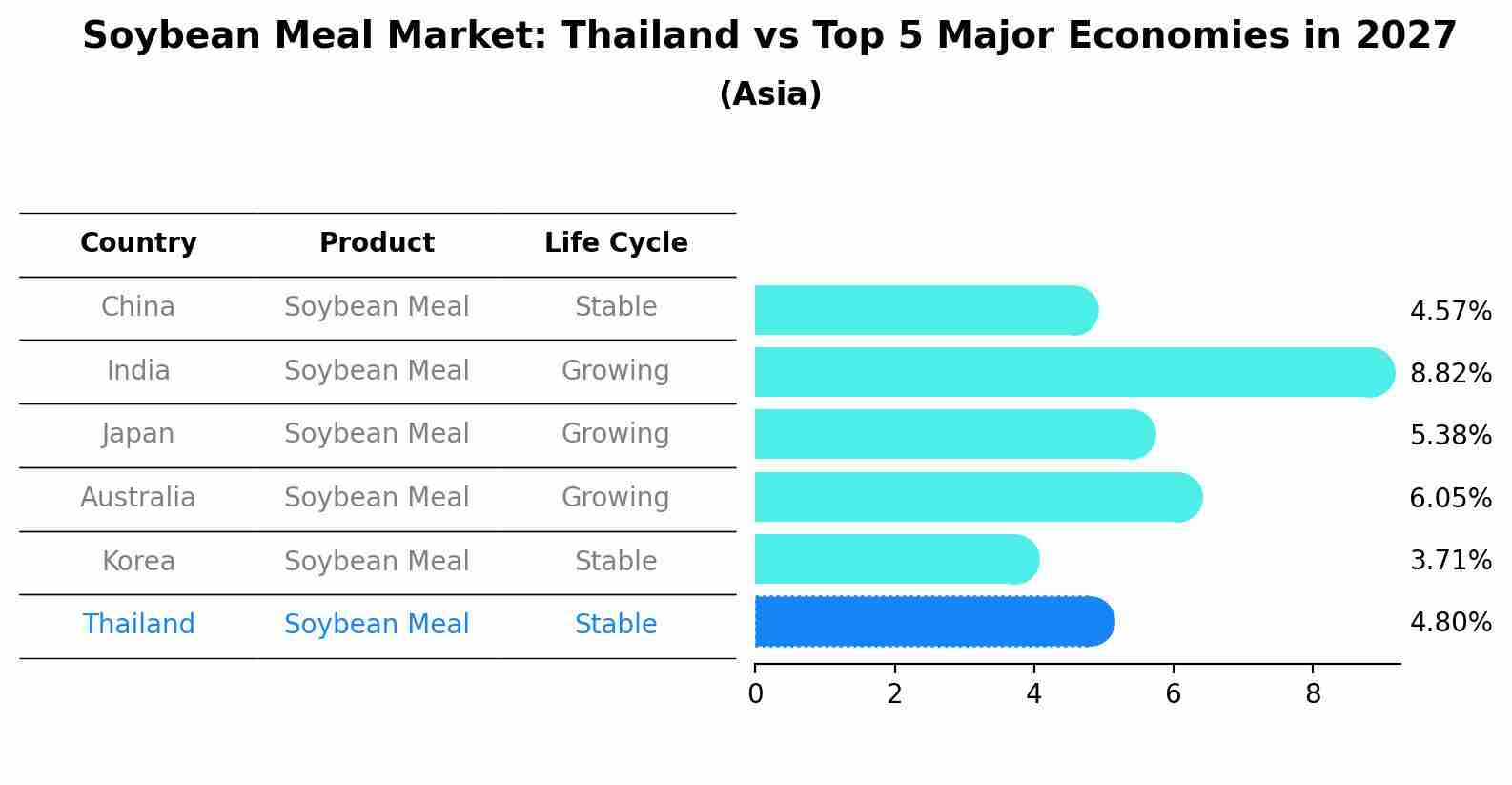Thailand Soybean Meal Market (2025-2031) Outlook | Analysis, Forecast, Revenue, Trends, Industry, Growth, Companies, Share, Size & Value
| Product Code: ETC384985 | Publication Date: Aug 2022 | Updated Date: Apr 2025 | Product Type: Market Research Report | |
| Publisher: 6Wresearch | No. of Pages: 75 | No. of Figures: 35 | No. of Tables: 20 | |
Thailand Soybean Meal Market Size Growth Rate
The Thailand Soybean Meal Market is likely to experience consistent growth rate gains over the period 2025 to 2029. Commencing at 3.22% in 2025, growth builds up to 12.23% by 2029.

Soybean Meal Market: Thailand vs Top 5 Major Economies in 2027 (Asia)
By 2027, the Soybean Meal market in Thailand is anticipated to reach a growth rate of 4.80%, as part of an increasingly competitive Asia region, where China remains at the forefront, supported by India, Japan, Australia and South Korea, driving innovations and market adoption across sectors.

Thailand Soybean Meal Market Synopsis
Thailand soybean meal market is integral to its livestock and poultry industries. Soybean meal is a primary protein source in animal feed formulations. This market is closely linked to the global soybean market, and Thailand relies on imports to meet its demand. Local production and processing facilities are also essential components of this market.
Drivers of the Market
The Thailand soybean meal market is influenced by the growing demand for protein-rich animal feed. With the expansion of the livestock and poultry industries, soybean meal has become a vital component of feed formulations. Importantly, it serves as a cost-effective protein source. International trade agreements and changing dietary preferences also impact the soybean meal market, as it is a key ingredient in the production of various processed foods.
Challenges of the Market
The Thailand soybean meal market faces several challenges in its operation. Firstly, it grapples with inconsistent and unpredictable weather conditions that directly impact soybean crop yields. Frequent floods and droughts can lead to supply shortages, thereby affecting the availability and pricing of soybean meal. Additionally, competition from alternative protein sources like fish meal and other vegetable protein meals poses a challenge. The need for sustainable soybean farming practices and concerns about deforestation linked to soybean cultivation also raise environmental challenges. Lastly, trade regulations and import restrictions can impact the soybean meal market`s access to international markets, affecting both supply and demand dynamics.
COVID-19 Impact on the Market
The soybean meal market in Thailand faced challenges related to supply chain disruptions and changes in demand patterns. Initially, there were concerns about soybean meal supply for livestock feed. However, the industry adjusted by exploring alternative protein sources and enhancing storage facilities. The market saw a shift in focus towards sustainable and locally sourced protein feed ingredients as a result of the pandemic.
Key Players in the Market
Leading companies in the Thailand soybean meal market include Cargill Thailand and Charoen Pokphand Foods Public Co., Ltd. These companies are pivotal in the production and distribution of soybean meal, a critical component in livestock feed formulations. Their dedication to quality and sustainability ensures a steady supply of this essential ingredient.
Key Highlights of the Report:
- Thailand Soybean Meal Market Outlook
- Market Size of Thailand Soybean Meal Market, 2024
- Forecast of Thailand Soybean Meal Market, 2031
- Historical Data and Forecast of Thailand Soybean Meal Revenues & Volume for the Period 2021-2031
- Thailand Soybean Meal Market Trend Evolution
- Thailand Soybean Meal Market Drivers and Challenges
- Thailand Soybean Meal Price Trends
- Thailand Soybean Meal Porter's Five Forces
- Thailand Soybean Meal Industry Life Cycle
- Historical Data and Forecast of Thailand Soybean Meal Market Revenues & Volume By Application for the Period 2021-2031
- Historical Data and Forecast of Thailand Soybean Meal Market Revenues & Volume By Animal Feed for the Period 2021-2031
- Historical Data and Forecast of Thailand Soybean Meal Market Revenues & Volume By Food Industry for the Period 2021-2031
- Historical Data and Forecast of Thailand Soybean Meal Market Revenues & Volume By Beverage for the Period 2021-2031
- Historical Data and Forecast of Thailand Soybean Meal Market Revenues & Volume By Healthcare Products for the Period 2021-2031
- Thailand Soybean Meal Import Export Trade Statistics
- Market Opportunity Assessment By Application
- Thailand Soybean Meal Top Companies Market Share
- Thailand Soybean Meal Competitive Benchmarking By Technical and Operational Parameters
- Thailand Soybean Meal Company Profiles
- Thailand Soybean Meal Key Strategic Recommendations
Frequently Asked Questions About the Market Study (FAQs):
- Single User License$ 1,995
- Department License$ 2,400
- Site License$ 3,120
- Global License$ 3,795
Search
Related Reports
- Portugal Electronic Document Management Market (2025-2031) | Strategy, Consumer Insights, Analysis, Investment Trends, Opportunities, Growth, Size, Share, Industry, Revenue, Segments, Value, Segmentation, Supply, Forecast, Restraints, Outlook, Competition, Drivers, Trends, Demand, Pricing Analysis, Competitive, Strategic Insights, Companies, Challenges
- France Electronic Document Management Market (2025-2031) | Strategy, Consumer Insights, Analysis, Investment Trends, Opportunities, Growth, Size, Share, Industry, Revenue, Segments, Value, Segmentation, Supply, Forecast, Restraints, Outlook, Competition, Drivers, Trends, Demand, Pricing Analysis, Competitive, Strategic Insights, Companies, Challenges
- Portugal Occupational Health & Safety Services Market (2025-2031) | Strategy, Consumer Insights, Analysis, Investment Trends, Opportunities, Growth, Size, Share, Industry, Revenue, Segments, Value, Segmentation, Supply, Forecast, Restraints, Outlook, Competition, Drivers, Trends, Demand, Pricing Analysis, Competitive, Strategic Insights, Companies, Challenges
- Netherlands Occupational Health and Safety Services Market (2025-2031) | Strategy, Consumer Insights, Analysis, Investment Trends, Opportunities, Growth, Size, Share, Industry, Revenue, Segments, Value, Segmentation, Supply, Forecast, Restraints, Outlook, Competition, Drivers, Trends, Demand, Pricing Analysis, Competitive, Strategic Insights, Companies, Challenges
- Belgium and Luxembourg Facility Management Market (2025-2031) | Strategy, Consumer Insights, Analysis, Investment Trends, Opportunities, Growth, Size, Share, Industry, Revenue, Segments, Value, Segmentation, Supply, Forecast, Restraints, Outlook, Competition, Drivers, Trends, Demand, Pricing Analysis, Competitive, Strategic Insights, Companies, Challenges
- Russia Women Intimate Apparel Market (2025-2031) | Strategy, Consumer Insights, Analysis, Investment Trends, Opportunities, Growth, Size, Share, Industry, Revenue, Segments, Value, Segmentation, Supply, Forecast, Restraints, Outlook, Competition, Drivers, Trends, Demand, Pricing Analysis, Competitive, Strategic Insights, Companies, Challenges
- Africa Chocolate Market (2025-2031) | Size, Share, Trends, Growth, Revenue, Analysis, Forecast, industry & Outlook
- Global Hydroxychloroquine And Chloroquine Market (2025-2031) | Industry, Trends, Size, Outlook, Growth, Value, Companies, Revenue, Analysis, Share, Forecast
- Saudi Arabia Plant Maintenance Market (2025-2031) | Industry, Size, Growth, Revenue, Value, Companies, Forecast, Analysis, Share & Trends
- Taiwan Electric Truck Market (2025-2031) | Outlook, Industry, Revenue, Size, Forecast, Growth, Analysis, Share, Companies, Value & Trends
Industry Events and Analyst Meet
Our Clients
Whitepaper
- Middle East & Africa Commercial Security Market Click here to view more.
- Middle East & Africa Fire Safety Systems & Equipment Market Click here to view more.
- GCC Drone Market Click here to view more.
- Middle East Lighting Fixture Market Click here to view more.
- GCC Physical & Perimeter Security Market Click here to view more.
6WResearch In News
- Doha a strategic location for EV manufacturing hub: IPA Qatar
- Demand for luxury TVs surging in the GCC, says Samsung
- Empowering Growth: The Thriving Journey of Bangladesh’s Cable Industry
- Demand for luxury TVs surging in the GCC, says Samsung
- Video call with a traditional healer? Once unthinkable, it’s now common in South Africa
- Intelligent Buildings To Smooth GCC’s Path To Net Zero













